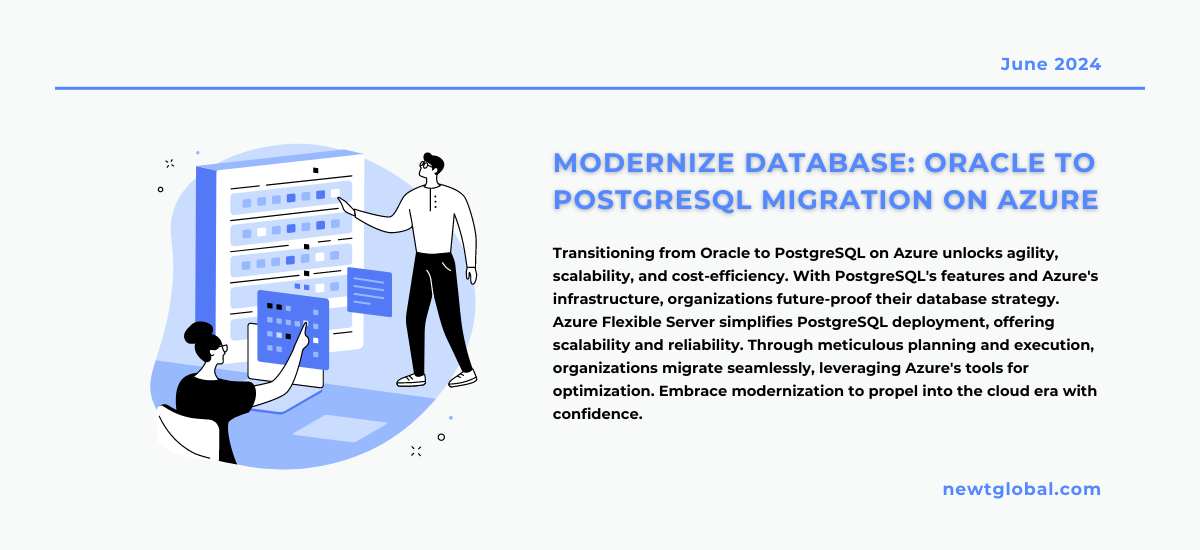
Are you seeking to modernize your database infrastructure for improved agility, scalability, and cost-efficiency? If you’re a seasoned Oracle user or a PostgreSQL enthusiast looking to migrate to a more flexible and innovative platform, the solution lies within the Azure ecosystem. Explore how transitioning from Oracle to PostgreSQL on Azure Flexible Server can revolutionize your database management strategy and propel your organization into the future of cloud computing.
In today’s fast-paced digital landscape, businesses are constantly seeking ways to innovate, streamline operations, and reduce costs. A critical aspect of this transformation is modernizing the underlying infrastructure, particularly databases, to meet the evolving needs of modern applications and workloads. For many organizations, transitioning from legacy systems such as Oracle to more agile, cost-effective solutions like PostgreSQL on Azure Flexible Server represents a strategic move towards greater efficiency, flexibility, and competitiveness.
Why Modernize Your Database?
Agility and Scalability:
Traditional database systems like Oracle often struggle to keep pace with the dynamic demands of modern applications. They may require costly hardware upgrades or complex configurations to scale effectively. In contrast, PostgreSQL on Azure Flexible Server offers unparalleled agility and scalability, allowing organizations to adapt quickly to changing requirements and handle growing workloads with ease.
With PostgreSQL’s ability to scale horizontally through features like table partitioning and distributed database capabilities, organizations can handle increasing data volumes and user loads without major architectural changes. Azure Flexible Server further enhances scalability by allowing automatic scaling based on workload demands, ensuring optimal performance without over-provisioning resources.
Cost Efficiency:
The cost of maintaining Oracle licenses and infrastructure can be prohibitive for many organizations, particularly as data volumes continue to grow. By transitioning to PostgreSQL on Azure Flexible Server, businesses can significantly reduce their operating expenses, leveraging the cost-effective pricing model of Azure while benefiting from PostgreSQL’s open-source nature.
Azure Flexible Server offers a flexible pricing model based on consumption, allowing organizations to pay only for the resources they use. This eliminates the need for upfront hardware investments and allows for cost-effective scaling as workload demands fluctuate. Additionally, PostgreSQL’s open-source nature means organizations can avoid licensing fees, further reducing the total cost of ownership.
Innovation and Compatibility:
PostgreSQL is renowned for its extensive feature set, robustness, and compatibility with various programming languages and frameworks. It offers advanced capabilities such as JSON support, full-text search, and geospatial data processing, making it an ideal choice for modern application development.
With Azure Flexible Server, organizations can harness the power of PostgreSQL while seamlessly integrating with existing tools and workflows, driving innovation and accelerating time-to-market. Azure’s comprehensive ecosystem of services and integrations further enhances compatibility, enabling organizations to leverage existing investments while modernizing their database infrastructure.
The Azure Advantage
Azure Flexible Server stands out as a robust platform tailor-made for hosting PostgreSQL workloads, seamlessly integrating Azure’s reliability, scalability, and security features with the versatile capabilities and rich functionalities of PostgreSQL. Through Azure’s expansive global footprint, organizations gain the strategic advantage of deploying PostgreSQL instances in close proximity to their end-users, thereby ensuring minimal latency and maximum availability.
Azure’s suite of built-in monitoring and management tools streamlines database administration tasks, liberating organizations to concentrate on driving innovation rather than grappling with infrastructure intricacies. Furthermore, Azure Security Center stands as a formidable bulwark against potential threats, furnishing advanced threat detection mechanisms and actionable security recommendations. By harnessing these capabilities, organizations can ensure that their PostgreSQL databases, hosted on Azure Flexible Server, remain fortified against security breaches and compliant with stringent industry standards.
Making the Transition
Transitioning from Oracle to PostgreSQL on Azure Flexible Server requires careful planning and execution to minimize disruption and maximize success. Here are some essential steps to consider:
Assessment and Planning:
Evaluate your existing Oracle database environment, identifying dependencies, performance bottlenecks, and migration challenges. Develop a comprehensive migration plan, considering factors such as data volume, complexity, and downtime tolerance.
Schema and Data Migration:
Convert your Oracle database schema to PostgreSQL-compatible format and migrate your data using appropriate tools and techniques. Azure Database Migration Service (DMS) offers a convenient, fully managed solution for transferring large volumes of data with minimal downtime and risk.
Testing and Validation:
Thoroughly test your migrated database to ensure data integrity, performance, and compatibility with existing applications. Conduct rigorous validation and benchmarking to identify and address any issues before proceeding to production.
Deployment and Optimization:
Deploy your PostgreSQL database on Azure Flexible Server, leveraging Azure’s management and monitoring tools to optimize performance, scalability, and cost-effectiveness. Fine-tune configuration settings, implement best practices, and monitor resource utilization to ensure optimal operation.
Conclusion
Modernizing your database by transitioning from Oracle to PostgreSQL on Azure Flexible Server is a strategic decision that can unlock new levels of agility, efficiency, and innovation for your organization. By embracing the scalability, cost-effectiveness, and feature-richness of PostgreSQL, coupled with the reliability and flexibility of Azure, businesses can future-proof their database infrastructure and stay ahead in today’s rapidly evolving digital landscape. Start your journey towards modernization today and empower your organization to thrive in the cloud era.
Ready to take the next step towards modernizing your database infrastructure? Visit newtglobal.com to learn more about our cloud migration services and how we can help you seamlessly transition from Oracle to PostgreSQL on Azure Flexible Server. For inquiries, reach out to us at marketing@newtglobalcorp.com and let’s start your journey towards a more agile, cost-effective, and future-proof database solution today.
